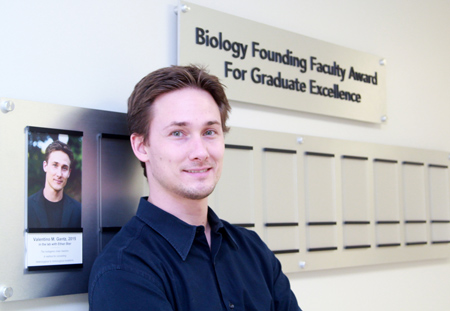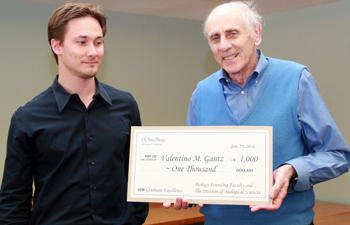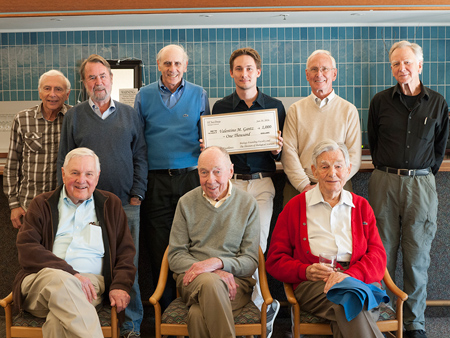Valentino Gantz Wins Biology Founding Faculty Award for Graduate Excellence
February 3, 2016
By Kim McDonald

Valentino Gantz
Valentino Gantz, a graduate student who published a widely-cited paper in the journal Science last March, is the winner of the first annual Biology Founding Faculty Award for Graduate Excellence.
The $1,000 award was presented to Gantz by Stuart Brody, an emeritus professor of biology who chaired the selection committee, at a ceremony at the UC San Diego Faculty Club. Gantz’s name and picture, and those of future awardees, will be on permanent display in the lobby of Bonner Hall. The Award for Graduate Excellence was endowed by donations from the Division of Biological Sciences’ founding faculty.
Brody noted in presenting the award that Gantz had “set a high bar” this year for future recipients of the award, which recognizes “the best first author paper by a graduate student the previous year.” The selection committee for the award includes faculty, donors and representatives from each of the Division’s four Sections.

Valentino Gantz accepts the award from founding faculty member Stu Brody.
Brody added that the award, which he hopes will be used to enhance the recruitment of graduate students, represents the continuing commitment and engagement of founding faculty to the division.
“It shows that the founding faculty still care about the Division and want to participate collectively in its future,” said Brody.
Gantz works in the laboratory of Ethan Bier, a professor of biology in the Section of Cell and Developmental Biology who co-authored the landmark paper in Science, which over the past year has become the subject of frequent news articles and broadcasts around the world.
Working on the fruit fly Drosophila melanogaster, the two biologists last year developed a new method for generating mutations in both copies of a gene in a single generation that could rapidly accelerate genetic research on diverse species, providing scientists with a powerful new tool to control insect borne diseases such as malaria as well as animal and plant pests.
They called their new genetic method the “mutagenic chain reaction,” or MCR.

Biology emeritus faculty celebrate with the award winner. Pictured from left to right, top row: Mel Green, Bill Loomis, Stu Brody, Valentino Gantz, Immo Scheffler, Doug Smith. Bottom row: Don Helinski, Russ Doolittle, Dan Lindsley.
“MCR is remarkably active in all cells of the body with one result being that such mutations are transmitted to offspring via the germline with 95 percent efficiency,” said Gantz. “Thus, nearly all gametes of an MCR individual carry the mutation in contrast to a typical mutant carrier in which only half of the reproductive cells are mutant.”
Bier said “there are several profound consequences of MCR. First, the ability to mutate both copies of a gene in a single generation should greatly accelerate genetic research in diverse species. For example, to generate mutations in two genes at once in an organism is typically time consuming, because it requires two generations, and involved, because it requires genetic testing to identify rare progeny carrying both mutations. Now, one should simply be able to cross individuals harboring two different MCR mutants to each other and all their direct progeny should be mutant for both genes.”
“MCR should also be highly effective for dispersing genetic elements in populations to control insect borne diseases such as malaria, dengue and chikungunya as well as animal and plant pests,” added Bier. “For example, in the case of malaria, several groups have created genetic cassettes that when introduced into mosquitoes prevent the malarial parasite from propagating thereby blocking infection. A major challenge in the field, however, has been devising a way to disseminate these gene cassettes throughout mosquito populations. MCR offers an obvious solution to this problem since the incorporation of an anti-malarial gene cassette into an MCR element should result in the rapid spread of the gene cassette through the target population. For example, if one in 100 individuals initially carried the cassette, the cassette should spread to virtually all individuals in as few as 10 generations, which is less than one season for mosquitoes.”
Biology alumni and friends of the Division can also join the founding faculty in supporting outstanding graduate students, like Gantz, with a gift to the Biology Founding Faculty Award for Graduate Excellence. Gifts can be made online by clicking here. They can also be made in honor of a professor or mentor that made an impact in your life. When making an online gift, please indicate in the comment section: “Designate to Founding Faculty Award.” For more information or for assistance with a gift, please contact (858) 534-1966 or ktrojnar@ucsd.edu.
